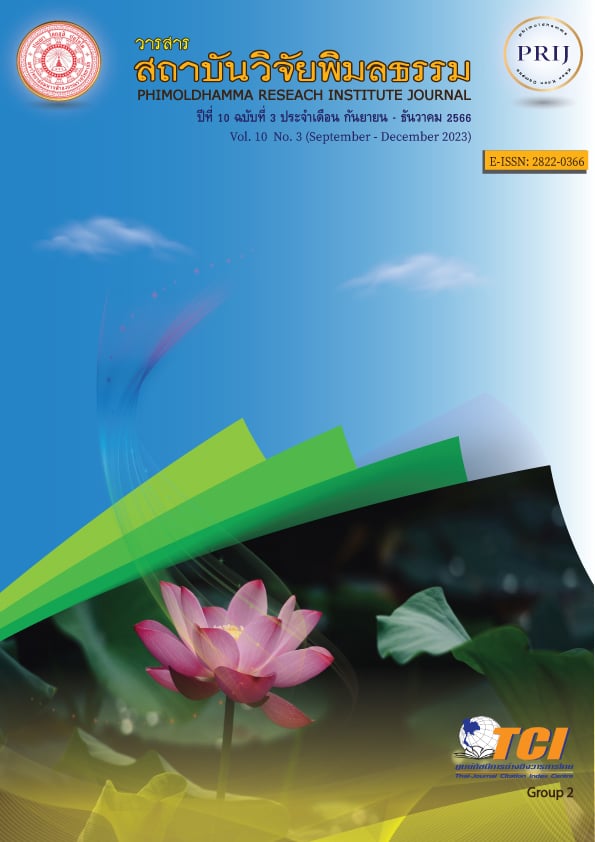An Analysis Study of The Beauty of Wooden Buddha Statues According to Aesthetic Principles in Suan Chik Sub-District, Sri Somdej District Roi Et Province
Keywords:
Wooden Buddha Statue, The Beauty of The Wooden Buddha Statue, Aesthetics, Aesthetic BeautyAbstract
This research was aimed to: 1) to study the history of the development and construction of wooden Buddha statues of the people of Suan Chik Subdistrict, Sri Somdej District Roi Et Province, 2) to study the criteria of judging beauty in terms of aesthetics, and 3) to analyze the beauty of wooden Buddha statues according to aesthetic principles in Suan Chik Sub-district, Sri Somdej District, Roi Et Province. It is qualitative research. The main informant population includes monks and local scholars and people in the area, 30 persons by using in-depth interviews to collect data and presented the research results with using descriptive analysis methods.
The research results found that:
1. The wooden Buddha statue was created out of respect for the faith of Buddhists in the Suan Chik Sub-district community. The creation has changed according to the era. The development of wood used for carving originally, it was popular to use trees with auspicious names. At the present, it is popular to use wood that is widely available. It is a hardwood with a core that can be carved. In the carvings, it was found that there were more and more styles of postures.
2. The criteria of judging aesthetic beauty, there are 3 theories: 1) materialism theory, which believes that true beauty is found in objects, not related to the mind, 2) mentalism theory, which believes that beauty is a property of the mind, not an object, and 3) relativism theory, there is a belief that is halfway between the theories of materialism and spiritualism. And most importantly, it must be combined with the religious and cultural beliefs of that society.
3. The wooden Buddha statue in Suan Chik Sub-district, there is inner beauty in the values and objects that form the strength of faith of Buddhists in the community. If we apply the principles of relativism theory used to analyze the external beauty and found that it is a wooden Buddha statue that has special characteristics. If we analyze the internal beauty, it is found that the wooden Buddha image was planted as an object of worship. It is a religious and cultural belief which is the original context of the community. It is considered to be a community that truly believes and respects Buddhism.
References
กรมการศาสนา. (2525). ประวัติพุทธรูปปางต่างๆ. กรุงเทพฯ: กรมการศาสนากระทรวงศึกษาธิการ.
กรมพระดำรงราชานุภาพ, พระเจ้าบรมวงศ์เธอ. (2469). ตำนานพุทธเจดีย์สยาม. พระนคร: โสภณพิพรรฒธนากร.
กานต์ กาญจนพิมาย. (2553). การศึกษาวิเคราะห์พระพุทธรูปไม้อีสานเชิงปรัชญา. (วิทยานิพนธ์ศิลปศาสตรมหาบัณฑิต). ขอนแก่น: มหาวิทยาลัยขอนแก่น.
นิราศ ศรีขาวรส. (2558). พระพุทธรูปไม้: สุนทรียภาพและความสัมพันธ์กับวิถีชีวิตคนในเมืองหลวงพระบางสาธารณรัฐประชาธิปไตยประชาชนลาวท่ามกลางกระแสโลกาภิวัตน์. วารสารศิลปกรรมศาสตร์ มหาวิทยาลัยขอนแก่น, 7(2), 17-40.
พระใบฎีกานรินทร์ สีลเตโช. (2565). ความงามของพระพุทธรูปไม้ตามหลักสุนทรียศาสตร. วารสารพุทธปรัชญาวิวัฒน์, 6(1), 240-253.
พระมหาปพน กตสาโร. (2560). พระพุทธรูปไม้: คุณค่าและคติธรรมของคนอีสาน. วารสารวิชาการธรรมทรรศน์, 17(2), 99-113.
วิบูลย์ ลี้สุวรรณ. (2546). ศิลปะชาวบ้าน Folk art. (พิมพ์ครั้งที่ 3). กรุงเทพฯ: อมรินทร์.
สถิต วงศ์สวรรค์. (2540). ปรัชญาเบื้องต้น. กรุงเทพฯ: รวมสาส์น.






